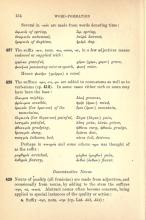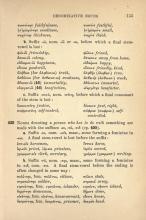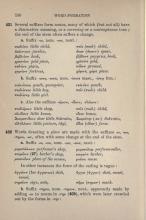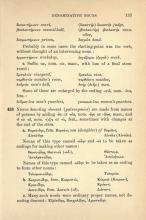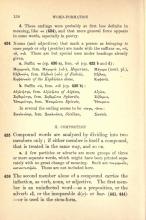429. Nouns of quality (all feminine) are made from adjectives, and occasionally from nouns, by adding to the stem the suffixes -τητ, -ιᾱ,
-συνᾱ. Abstract nouns often become concrete, being applied to special instances of the quality or action.
a. Suffix -τητ, nominative -της (cp. Latin -tāt, -tās).
| πιστότης faithfulness |
πιστό-ς faithful |
| (σ)μῑκρό-της smallness |
(σ)μῑκρό-ς small |
| παχύ-της thickness |
παχύ-ς thick |
b. Suffix -ιᾱ, nominative -ίᾱ or -ια, before which a final stem vowel is lost.
| φιλ-ίᾱ friendship |
φίλο-ς friend |
| ἀποικ-ίᾱ colony |
ἄποικο-ς away from home |
| εὐδαιμον-ίᾱ happiness |
εὐδαίμων happy |
| εὔνοια good-will |
εὔνοο-ς friendly, kind |
| ἀλήθεια (for ἀληθεσ-ια) truth |
ἀληθής (ἀληθεσ-) true |
| ἀσθένεια (for ἀσθενεσια) weakness |
ἀσθενής (ἀσθενεσ-) weak |
| ἀθανασ-ίᾱ immortality (§ 46) |
ἀθάνατο-ς immortal |
| εὐεργεσ-ίᾱ benefaction (§ 46) |
εὐεργέτης benefactor |
c. Suffix -συνᾱ, nominative -σύνη, before which a final consonant of the stem is lost.
430. Nouns denoting a person who has to do with something are made with the suffixes -ευ, -τᾱ, -τιδ (cp. § 405).
a. Suffix -ευ, nominative -εύς, masculine, some forming a feminine in -εια. A final stem vowel is lost before the suffix.
| ἴππ-εύς horseman |
ἴππο-ς horse |
| ἱερ-εύς priest |
ἱερό-ς sacred |
| ἱέρ-εια priestess |
|
| γραμματ-εύς clerk, secretary |
γράμμα (γραμματ-) writing |
b. Sufix -τᾱ, nominative -της (masculine), some forming a feminine in -τιδ, nominative -τις. A final stem vowel before the ending is often changed in some way.
431. Several suffixes form nouns, many of which (but not all) have a diminutive meaning, or a caressing or a contemptuous tone; the end of the stem often suffers a change.
a. Suffix -ιο, nominative -ιον (neuter).
| παιδ-ίο-ν little child |
παῖς (παιδ-) child |
|
| ἀκόντ-ιο-ν javelin |
ἄκων (ἀκοντ-) spear |
|
| βιβλ-ίο-ν bοοk |
βίβλο-ς papyrus, book |
|
| χρυσ-ίο-ν gold piece |
χρῡσό-ς gold |
|
| πεδ-ίο-ν plain |
πέδο-ν ground |
|
| χωρ-ίο-ν fortress |
χῶρο-ς place |
χώρᾱ land |
b. Suffix -ισκο, -ισκᾱ, nominative -ίσκος (mascasculine), -ίσκη (feminine).
| νεᾱν-ίσκος youth, youngster |
νεᾱνίᾱ-ς youth |
| παιδ-ίσκος little boy |
παῖς (παιδ-) child |
| παιδ-ίσκη little girl |
c. Also the suffixes -άριο-ν, -ίδιο-ν, -ύλλιο-ν.
| παιδ-άριο-ν little chap |
παῖς (παιδ-) child |
| οἰκ-ίδιο-ν little house |
οἶκος hοuse |
| Σωκρατ-ίδιο-ν dear little Sokrates |
Σωκράτης (-εσ-) Sokrates |
| εἰδ-ύλλιο-ν little picture, idyl |
εἶδος (εἰδεσ-) form |
432. Words denoting a place are made with the suffixes -ιο, -ειο, -τηριο, -ων, often with some change at the end of the stem.
a. Suffix -ιο, -ειο, nominative -ιον, -ειον, neuter.
| μυροπώλ-ιο-ν perfumerʼs shop |
μυροπώλης perfume-seller |
| κουρεῖο-ν barberʼs shop (§ 27) |
κουρεύ-ς barber |
| μουσ-εῖο-ν place of the muses |
μοῦσα muse |
In other instances the force of the ending is vague.
| ἀγγεῖον (for ἀγγεσ-ιον) dish, vessel |
ἄγγος (ἀγγεσ-) dish, vessel |
| σημεῖο-ν sign, note |
σῆμα (σηματ-) mark |
b. Suffix -τηριο, nominative -τηριον, neuter, apparently made by adding -ιο to nouns in -τηρ (§ 405), which were later crowded out by the forms in -της.
| δικασ-τήρ-ιο-ν court |
δικαστής (δικαστήρ) judge |
| βουλευ-τήρ-ιο-ν council-hall |
βουλευτής (βουλευ-τήρ) councilor |
| δεσμω-τήρ-ιο-ν prison |
δεσμό-ς bond |
Probably in some cases the starting-point was the verb, without thought of an intervening noun.
| ἐργασ-τήριο-ν wοrkshop |
ἐργάζομαι (ἐργαδ-) work |
c. Suffix -ων, nominative -ών, masculine, with loss of a final stem vowel.
| ἀμπελ-ών vineyard |
ἄμπελος vine |
| παρθεν-ών maidenʼs room |
παρθένο-ς maiden |
| ἀνδρ-ών menʼs hall |
ἀνήρ (ἀνδρ-) man |
Some of these are enlarged by the ending -ιτιδ, nominative -ῖτις, feminine.
433. Nouns denoting descent (patronymics) are made from names of persons by adding -δᾱ or -ιδᾱ, nominative -δης or -ίδης, masculine, and -δ or -ιδ, nominative -(ά)ς or -ίς, feminine, sometimes with changes at the end of the stem.
a.
| Bορεά-δης | son of | Bορέᾱ-ς |
| Bορεά-ς | daughter of | |
| Αἰνεά-δης | son of | Αἰνέᾱς (Αἰνείᾱς) |
Nouns of this type caused -άδης and -άς to be taken as endings for making other names.
| Θεστι-άδης | Θέστιο-ς |
| Θεστι-άς (-αδ-) | |
| Ἀσκληπι-άδης | Ἀσκλήπιο-ς |
Names of this type caused -ιάδης to be taken as an ending to form other nouns.
| Tελαμων-ιάδης | Tελαμών |
b.
| Κεκροπ-ίδης | Κέκροψ (Κεκροπ-) |
| Κεκροπ-ίς | |
| Κρον-ίδης | Κρόνο-ς |
| Δανα-ίδης | Δάναο-ς |
| Δανα-ίς (-ιδ) |
c. Many such words were ordinary proper names, not denoting descent: Εὐρῑπίδης, Bακχυλίδης, Ἀριστείδης.
d. These endings were probably at first less definite in meaning, like -ιο (§ 424), and that more general force appears in some words, especially in poetry.
434. Nouns (and adjectives) that mark a person as belonging to some people or city (gentiles) are made with the suffixes -ευ, -τᾱ, -ιδ, -τιδ. These are but special uses under headings already given.
a. Suffix -ευ (cp. § 430.a), fem. -ιδ (cp. § 433.b & d).
| Mεγαρ-εύς | Megarian | Mέγαρα (neut. pl.) |
| Mεγαρ-ίς (-ιδ-) | ||
| Εὐβο-εύ-ς | of Euboia | Eὔβοια |
| Εὐβο-ίς (-ιδ-) | ||
| Κηφῑσι-εύς | of the Kephisian deme | Κηφῑσίᾱ |
b. Suffix -τᾱ, fem. -τιδ (cp. § 430.b).
| Αἰγῑνή-της, | of Aigina | Αἴγῑνα |
| Aἰγῑνῆ-τις | ||
| Συβαῑ́ρ-της | Sybarite | Σύβαρι-ς |
| Συβαρῖ-τις | ||
| Ἠπειρώ-της | Epirote | Ἤπειρο-ς |
| Ἠπειρῶ-τις |
In several the ending seems to be -ώτης, -ῶτις:
| Σικελι-ώτης | Sicilian | Σικελίᾱ |
| Σικελι-ῶτις |

